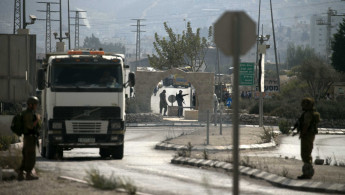'Worst Ramadan season ever' because of Israeli restrictions, says Hawara's mayor
This year's commercial Ramadan season is "the worst ever in Hawara", the mayor of the Palestinian town, south of the occupied West Bank city of Nablus, Muin Dmeidi, said to The New Arab.
Mayor Dmeidi's comments came as Israeli forces continue to impose severe restrictions on accessing Hawara for the fourth week, severely damaging the town's commercial movement during the high season of the Muslim holy month, as local residents told TNA.
The town, located on the main road at the exact southern entrance of Nablus city, witnessed a recent wave of attacks by Israeli forces and settlers these past few months.
Israeli occupation forces forced the Palestinians to shut down their shops in Hawara town in Nablus city.#FreePalestine pic.twitter.com/XxKgY2ZPHX
— Al-Jarmaq News (@Aljarmaqnetnews) April 17, 2023
In late February, hundreds of Israeli settlers attack Hawara, in what Palestinian and Israeli commentators described as a "pogrom", torching 30 Palestinian homes and 90 cars, killing one Palestinian relief worker and injuring dozens.
The Israeli settlers' rampage followed a shooting attack in which two Israeli settlers were killed in Hawara. The shooting itself came hours after Israeli forces had killed 11 Palestinians, including an elderly man, in a military raid on Nablus city.
Israeli settlers' attacks on Hawara persist on a smaller scale in the weeks that followed, with the participation of far-right Israeli politicians, while Israeli forces continued to impose on-and-off curfews and military closure over the besieged town.
Meanwhile, Palestinian militants targeted Israeli forces and settlers while imposing a military curfew in Hawara with drive-through shootings, twice since February's attack, wounding two soldiers and two settlers.
The Popular Front for the Liberation of Palestine's (PFLP) armed wing claimed both shootings.
Israeli occupation forces close the Hawara checkpoint, south of Nablus, in front of #Palestinains leaving the city. pic.twitter.com/1l0HBfGlv5
— Wafa News Agency - English (@WAFANewsEnglish) April 17, 2023
"Hawara is located on a strategic point where all circulation between the north and the centre of the occupied West Bank crosses," said the mayor.
"Hawara's main street is a commercial hub, and the town's economy depends on it, so when the occupation restricts access to Hawara, it kills the economy," pointed out the mayor. "Ramadan is a high season for Hawara, and now the season is being choked out by the occupation."
"The occupation army installed some 15 military outposts in Hawara, mostly on the main street," Mahmoud Shehadeh, a business owner in Hawara, told TNA.
"Access to the town is restricted from the Zaatara checkpoint to the south, and most people who come into Hawara do it through small secondary streets through surrounding villages," he explained.
"On Monday, the occupation soldiers forced us to close the doors of our businesses on the main street during the morning," said Shehadeh.
🎥 Watch: "Israeli occupation forces impose restrictions on the town of Hawara, south of Nablus, and impede the movement of vehicles."#PalYouth pic.twitter.com/5LCc7p7CLG
— PalYouth (@PalYouth4News) April 10, 2023
"The result of all this is that the main street in Hawara is being emptied of Palestinians, and made available only for Israeli settlers," he added.
The northern occupied West Bank witnessed another wave of Israeli settler violence in recent weeks. Last week, settlers destroyed dozens of olive trees in the village of Kufl Hares, near Tulkarm.
In early March, Israeli finance minister, Bezalel Smotrich, said that the town of Hawara "has to be wiped off the map and that the state of Israel, not the settlers, should do it", during a political event. Smotrich later withdrew his comments following a wave of international condemnation.





 Follow the Middle East's top stories in English at The New Arab on Google News
Follow the Middle East's top stories in English at The New Arab on Google News


